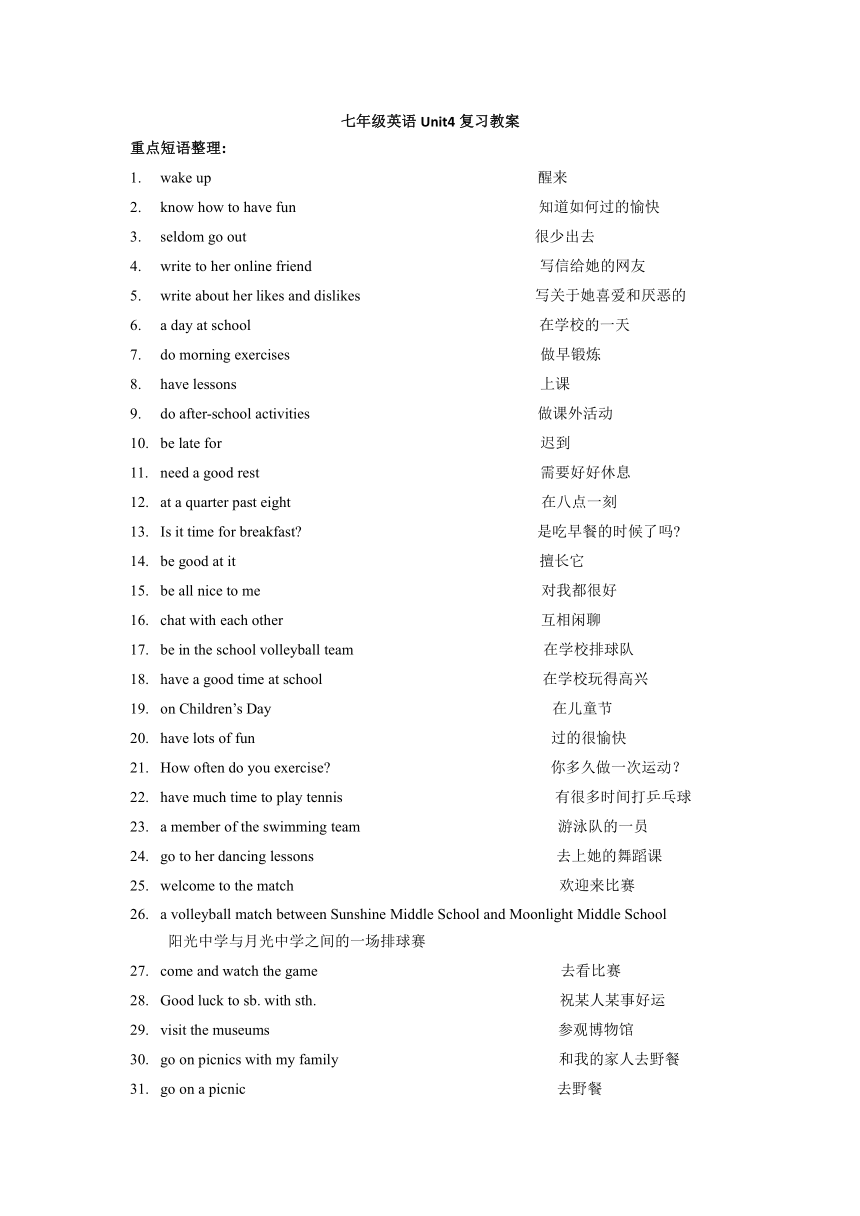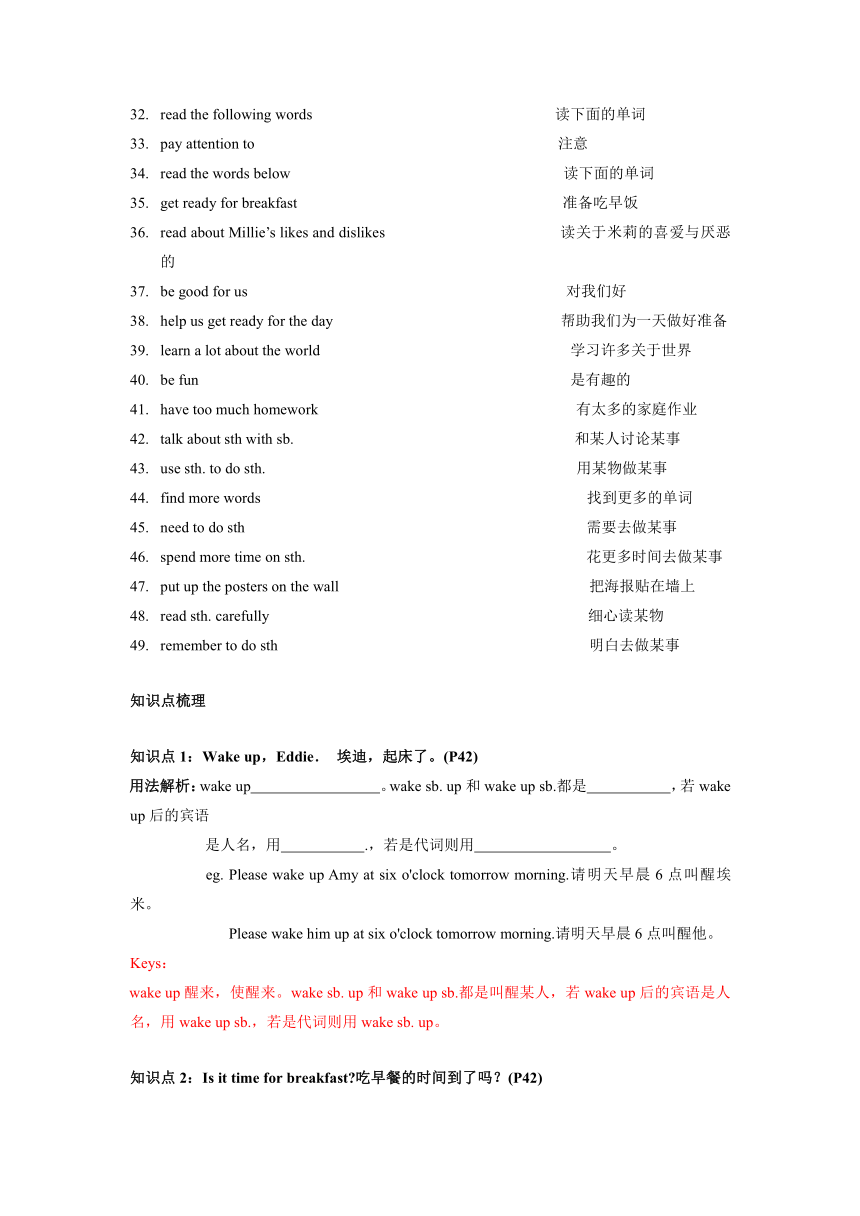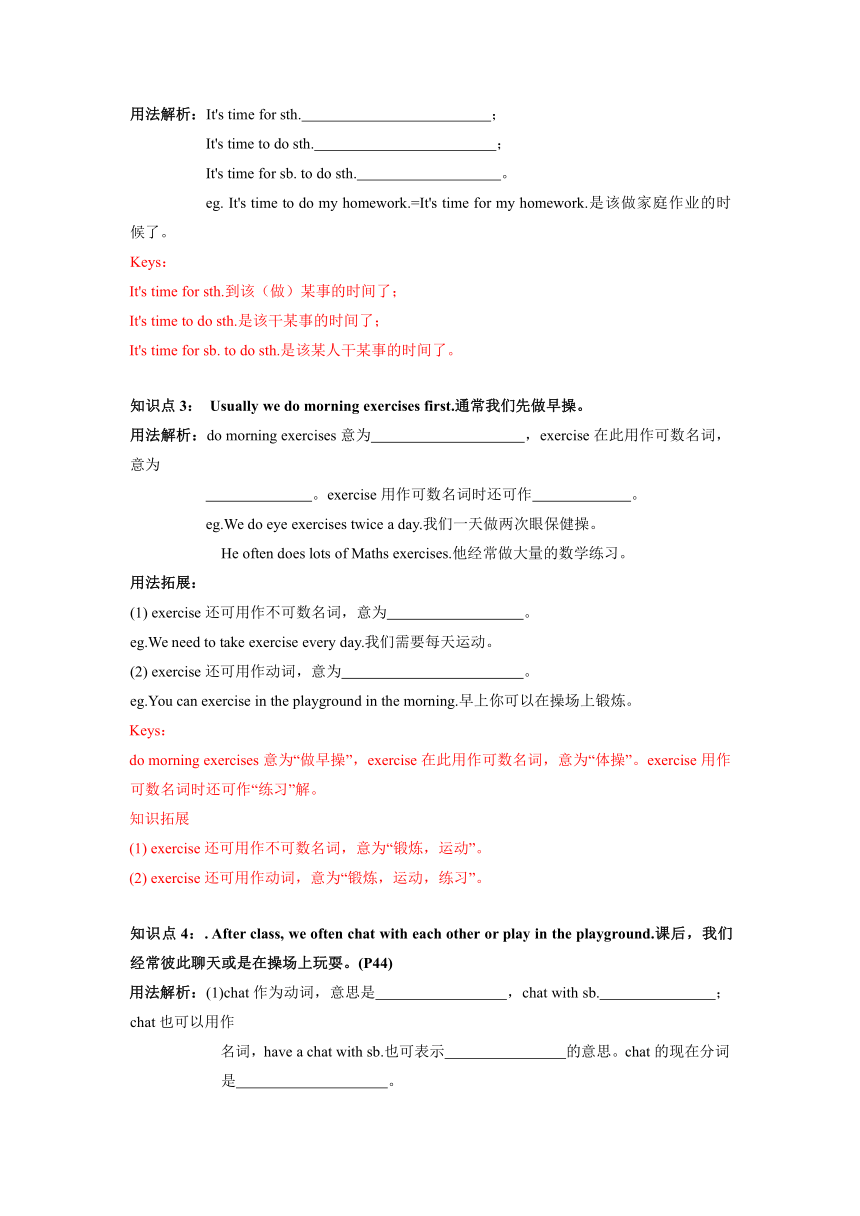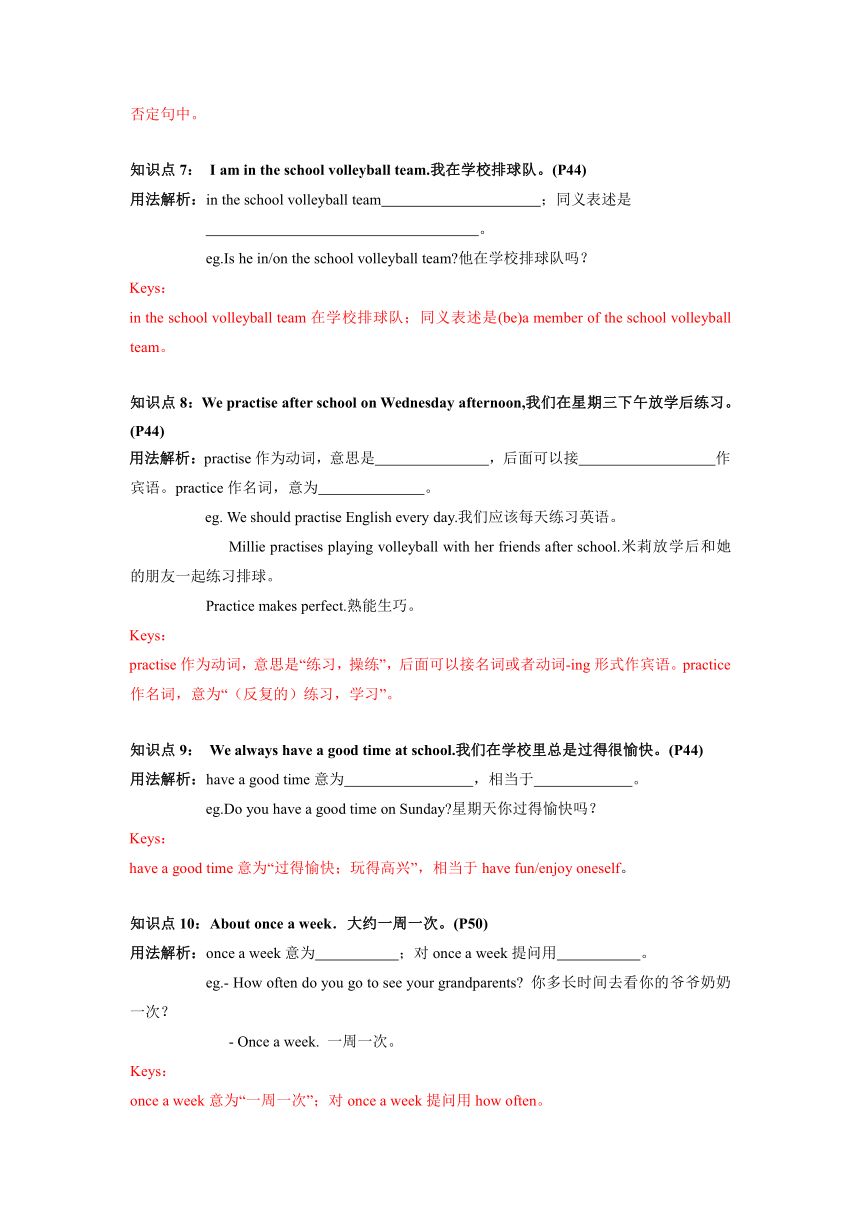江苏省仪征市月塘中学2019年七年级英语Unit 4 My day复习学案(含答案)
文档属性
| 名称 | 江苏省仪征市月塘中学2019年七年级英语Unit 4 My day复习学案(含答案) |  | |
| 格式 | zip | ||
| 文件大小 | 79.5KB | ||
| 资源类型 | 教案 | ||
| 版本资源 | 牛津译林版 | ||
| 科目 | 英语 | ||
| 更新时间 | 2019-08-04 12:31:20 | ||
图片预览





文档简介
七年级英语Unit4复习教案
重点短语整理:
1. wake up 醒来
2. know how to have fun 知道如何过的愉快
3. seldom go out 很少出去
4. write to her online friend 写信给她的网友
5. write about her likes and dislikes 写关于她喜爱和厌恶的
6. a day at school 在学校的一天
7. do morning exercises 做早锻炼
8. have lessons 上课
9. do after-school activities 做课外活动
10. be late for 迟到
11. need a good rest 需要好好休息
12. at a quarter past eight 在八点一刻
13. Is it time for breakfast? 是吃早餐的时候了吗?
14. be good at it 擅长它
15. be all nice to me 对我都很好
16. chat with each other 互相闲聊
17. be in the school volleyball team 在学校排球队
18. have a good time at school 在学校玩得高兴
19. on Children’s Day 在儿童节
20. have lots of fun 过的很愉快
21. How often do you exercise? 你多久做一次运动?
22. have much time to play tennis 有很多时间打乒乓球
23. a member of the swimming team 游泳队的一员
24. go to her dancing lessons 去上她的舞蹈课
25. welcome to the match 欢迎来比赛
26. a volleyball match between Sunshine Middle School and Moonlight Middle School
阳光中学与月光中学之间的一场排球赛
27. come and watch the game 去看比赛
28. Good luck to sb. with sth. 祝某人某事好运
29. visit the museums 参观博物馆
30. go on picnics with my family 和我的家人去野餐
31. go on a picnic 去野餐
32. read the following words 读下面的单词
33. pay attention to 注意
34. read the words below 读下面的单词
35. get ready for breakfast 准备吃早饭
36. read about Millie’s likes and dislikes 读关于米莉的喜爱与厌恶的
37. be good for us 对我们好
38. help us get ready for the day 帮助我们为一天做好准备
39. learn a lot about the world 学习许多关于世界
40. be fun 是有趣的
41. have too much homework 有太多的家庭作业
42. talk about sth with sb. 和某人讨论某事
43. use sth. to do sth. 用某物做某事
44. find more words 找到更多的单词
45. need to do sth 需要去做某事
46. spend more time on sth. 花更多时间去做某事
47. put up the posters on the wall 把海报贴在墙上
48. read sth. carefully 细心读某物
49. remember to do sth 明白去做某事
知识点梳理
知识点1:Wake up,Eddie. 埃迪,起床了。(P42)
用法解析:wake up 。wake sb. up和wake up sb.都是 ,若wake up后的宾语
是人名,用 .,若是代词则用 。
eg. Please wake up Amy at six o'clock tomorrow morning.请明天早晨6点叫醒埃米。
Please wake him up at six o'clock tomorrow morning.请明天早晨6点叫醒他。
Keys:
wake up醒来,使醒来。wake sb. up和wake up sb.都是叫醒某人,若wake up后的宾语是人名,用wake up sb.,若是代词则用wake sb. up。
知识点2:Is it time for breakfast?吃早餐的时间到了吗?(P42)
用法解析:It's time for sth. ;
It's time to do sth. ;
It's time for sb. to do sth. 。
eg. It's time to do my homework.=It's time for my homework.是该做家庭作业的时候了。
Keys:
It's time for sth.到该(做)某事的时间了;
It's time to do sth.是该干某事的时间了;
It's time for sb. to do sth.是该某人干某事的时间了。
知识点3: Usually we do morning exercises first.通常我们先做早操。
用法解析:do morning exercises意为 ,exercise在此用作可数名词,意为
。exercise用作可数名词时还可作 。
eg.We do eye exercises twice a day.我们一天做两次眼保健操。
He often does lots of Maths exercises.他经常做大量的数学练习。
用法拓展:
(1) exercise还可用作不可数名词,意为 。
eg.We need to take exercise every day.我们需要每天运动。
(2) exercise还可用作动词,意为 。
eg.You can exercise in the playground in the morning.早上你可以在操场上锻炼。
Keys:
do morning exercises意为“做早操”,exercise在此用作可数名词,意为“体操”。exercise用作可数名词时还可作“练习”解。
知识拓展
(1) exercise还可用作不可数名词,意为“锻炼,运动”。
(2) exercise还可用作动词,意为“锻炼,运动,练习”。
知识点4:. After class, we often chat with each other or play in the playground.课后,我们经常彼此聊天或是在操场上玩耍。(P44)
用法解析:(1)chat作为动词,意思是 ,chat with sb. ;chat也可以用作
名词,have a chat with sb.也可表示 的意思。chat的现在分词
是 。
eg.Sometimes I chat with my friends on the phone.有时,我和我的朋友在电话里聊天。
(2)each other意为 。
eg.We often help each other.我们经常互相帮助。
(3)in the playground意为 ,也可以用 。
eg.There are lots of children in the playground.在操场上有许多孩子。
Keys:
(1)chat作为动词,意思是“聊天,闲聊”,chat with sb.与某人聊天;chat也可以用作名词,have a chat with sb.也可表示“与某人聊天”的意思。chat的现在分词是chatting。
(2)each other意为“彼此,相互”。
(3)in the playground意为“在操场上”,也可以用on the playground。
知识点5:.They are all nice to me.他们对我都很好。(P44)
用法解析:be nice to sb. ,等同于 。
类似的短语还有:
be helpful to sb. ;
be polite to sb. 。
eg.We should be nice to each other.我们彼此应当友好相待。
All my classmates are helpful to me.我所有的同学都很乐于帮助我。
Keys:
be nice to sb.对某人友好,等同于be friendly to。
类似的短语还有:be helpful to sb.对某人有帮助的;be polite to sb.对某人有礼貌的。
知识点6:I also like playing volleyball.我也喜欢打排球。(P44)
用法解析:too和also都是副词,都表示 的意思。also通常放 之后,
之前,一般不用于句末;too多用于口语,通常放在句末,且too只用于 中,
不用于 中。
eg. I also like playing volleyball.我也喜欢打排球。
He plays the piano at weekends too.他在周末也弹钢琴。
He speaks French and he also writes it.他会说法语,也会写法语。
Keys:
too和also都是副词,都表示“也”的意思。also通常放在be动词、情态动词之后,行为动词之前,一般不用于句末;too多用于口语,通常放在句末,且too只用于肯定句中,不用于否定句中。
知识点7: I am in the school volleyball team.我在学校排球队。(P44)
用法解析:in the school volleyball team ;同义表述是
。
eg.Is he in/on the school volleyball team?他在学校排球队吗?
Keys:
in the school volleyball team在学校排球队;同义表述是(be)a member of the school volleyball team。
知识点8:We practise after school on Wednesday afternoon,我们在星期三下午放学后练习。(P44)
用法解析:practise作为动词,意思是 ,后面可以接 作宾语。practice作名词,意为 。
eg. We should practise English every day.我们应该每天练习英语。
Millie practises playing volleyball with her friends after school.米莉放学后和她的朋友一起练习排球。
Practice makes perfect.熟能生巧。
Keys:
practise作为动词,意思是“练习,操练”,后面可以接名词或者动词-ing形式作宾语。practice作名词,意为“(反复的)练习,学习”。
知识点9: We always have a good time at school.我们在学校里总是过得很愉快。(P44)
用法解析:have a good time意为 ,相当于 。
eg.Do you have a good time on Sunday?星期天你过得愉快吗?
Keys:
have a good time意为“过得愉快;玩得高兴”,相当于have fun/enjoy oneself。
知识点10:About once a week.大约一周一次。(P50)
用法解析:once a week意为 ;对once a week提问用 。
eg.- How often do you go to see your grandparents? 你多长时间去看你的爷爷奶奶一次?
- Once a week. 一周一次。
Keys:
once a week意为“一周一次”;对once a week提问用how often。
知识点11:They are good for us.它们对我们有益。
用法解析:be good for…意为 ,后接 作宾语。
eg.They often do morning exercises. It is good for their health.他们经常晨练,这对他们的健康有益。
Keys:
be good for…意为“对……有益”,后接名词、代词或动名词作宾语。
知识点12:I can learn a lot about the world.关于这个世界,我能了解很多。(P52)
用法解析:a lot副词,表示 。
eg.Thanks a lot.多谢。
用法辨析:
a lot,a lot of与lots of
(1)a lot可用作 。
eg.I can learn a lot about Chinese history.我可以学到很多有关中国历史方面的知识。
(2)a lot也可作 ,修饰动词,意思是 ,相当于 。
eg.1 like Chinese a lot.我非常喜欢语文。
(3)a lot of与lots of的意思和用法完全相同,都是起形容词作用的短语,后接 。
eg.There are a lot of/lots of books on the desk.课桌上有许多书。
Keys:
a lot副词,表示程度。
a lot,a lot of与lots of
(1)a lot可用作名词性短语。
(2)a lot也可作副词短语,修饰动词,意思是“十分,非常”,相当于very much。
(3)a lot of与lots of的意思和用法完全相同,都是起形容词作用的短语,后接可数名词或不可数名词。
知识点13:We always have too much homework!我们总是有太多的作业!(P52)
用法解析:too much意为 ,修饰 ;修饰可数名词用 ; much too 修
饰 。
eg.I have too much work to do today.今天我有太多的工作要做。
He has too many friends.他有太多的朋友。
This bag is much big. 这个包太大了。
Keys:
too much意为“太多”,修饰不可数名词;修饰可数名词用too many;much too 修饰形容词。
同步语法梳理
1.人称代词
(1)人称代词列表如下:
我 我们 你,你们 他 她 它 他们
主格 作主语
宾格 作宾语
Keys:
我 我们 你,你们 他 她 它 他们
主格 I we you he she it they 作主语
宾格 me us you him her it them 作宾语
例题训练:
1)—Who is the boy over there ?—__________ is my brother.
A. He B. His C. Him D. Himself
2) Mr. Wang is very friendly, and _________ like him very much.
A. we B. us C. our D. ours
3) I'm going skating. Would you like to go with __________?
A. me B. I C. my D. mine
4) Look at the photo. The girl beside __________ is Nancy.
A. I B. my C. me D. mine
Keys: AAAC
(2)人称代词的习惯顺序
如果有几个不同的人称代词同时作主语,且用_____________连接时,习惯顺序是单数:_____________,复数:_____________。
但是,如果是做错事,承担责任时,有时说话的人把I放到第一位。
例题训练:
_____________ (you we they) are from China.
_____________ (I you he) are all students.
Keys: 如果有几个不同的人称代词同时作主语,且用and,or连接时,习惯顺序是单数:you,he and I (二三一),复数:we, you and they (一二三)。
但是,如果是做错事,承担责任时,有时说话的人把I放到第一位。
we, you and they
you, he and I
2.表示时间的介词的用法
1)介词in:____________________
(1)用在“____________________”前。 如 in the morning/ afternoon/ evening
(2)用在“____________________”前。 如 in October
(3)用在“____________________”前。 如 in spring/ summer/ autumn/ winter
(4)用在“____________________”前。 如 in 2012
(5)用在“____________________”前, 如 in the 21st century
2)介词on:____________________
3)介词at:___________________
例题训练:
1. The wedding of Prince of William was held in Westminster Cathedral ____________ April 29,2011.
A. at B. in C. on D. by
2. Peter usually gets up early __________the morning.
A. on B. in C. at D. of
3. I go to school ___________ 8 o’clock in the morning.
A. at B. in C. on D. for
Keys: 1)介词in:表示在某段时间内
(1)用在“上午/下午/晚上”前。 如 in the morning/ afternoon/ evening
(2)用在“月份”前。 如 in October
(3)用在“季节”前。 如 in spring/ summer/ autumn/ winter
(4)用在“年”前。 如 in 2012
(5)用在“世纪”前, 如 in the 21st century
2)介词on:表示在具体某一天或某一天的早、中、晚。并用在表示星期几的名词前。
3)介词at:表示“在某时间或某时刻”。
CBA
3.如何使用频率副词
1)always 意为“_________”,频率最大,表示动作状态持续,中间没有间断。
2)usually意为“_________”,即很少例外,频率仅次于always。
3)often 意为“_________”,不如usually那么频繁,表示动作重复,中间有间断。
4)sometimes 意为“_________”,频率比often小,表示动作偶尔发生,间断较大。
5)seldom 意为“_________”,频率仅次于sometimes。
6)never意为“_________”,频率为零。
频率副词在句中的位置:
一般情况下这六个副词都放在_________之前,_________、_________或_________之后。但是sometimes的位置较灵活,可以放在_________,也可以放在_________或_________。
频度副词的提问:对这些频率副词进行提问常用疑问词_________。
Keys:
1)总是,永远 2)通常 3)经常,常常 4)有时,不时 5)很少,不常 6)从不,绝不
频率副词在句中的位置:
一般情况下这六个副词都放在实义动词之前,系动词be、助动词或情态动词之后。但是sometimes的位置较灵活,可以放在句中,也可以放在句首或句末。
频度副词的提问:对这些频率副词进行提问常用疑问词how often。
同步例题
1.Where _____ your friend ________? Gaogang.
A.do, come from B.is, come from C.does, from D.is, from
2.Tom's father is a Maths teacher. He teaches ________ Maths very______.
?????? A.we, good????? ? B.us, well???? C.we, well??????? D. us, good
3.-________ Mary happy today? -No. She ________ look happy this morning.
A.Is, isn’t B.Is, doesn’t C.Are, doesn’t D.Does, doesn’t
4.— Andy, what do you think of your teachers? — I think ______are very nice to_______.
A.they; us B.they; our C.them; us D.them; we
5.YOG (青奥会) comes summer?
Yes. And the 2nd YOG starts in Nanjing August 16.
A.in,on B.on, on C.at,on D.on, in
6.一_______ times does your father play tennis after work? —Twice a week.
A.How often B.How soon C.How many D.How much
7.Let him ________ you _______ our school.
A.to show, around B.show, for C.show, around D.shows, for
8.-I plan to go on a picnic to the Ocean Park next week. -______________.
A.Come back early B.That’s all right C.Have a good time D.All the best
9.Would you like _____ football with us? Of course. I enjoy____ football very much.
A.to play, play B.playing, to play C.to play, playing D.play, playing.
10.The library__________ at 2 every afternoon, so I think it __________now.
A.opens; opens B.opens; is open C.is open; opens D.is open; open
Keys:CBBAA CCCCB
重点短语整理:
1. wake up 醒来
2. know how to have fun 知道如何过的愉快
3. seldom go out 很少出去
4. write to her online friend 写信给她的网友
5. write about her likes and dislikes 写关于她喜爱和厌恶的
6. a day at school 在学校的一天
7. do morning exercises 做早锻炼
8. have lessons 上课
9. do after-school activities 做课外活动
10. be late for 迟到
11. need a good rest 需要好好休息
12. at a quarter past eight 在八点一刻
13. Is it time for breakfast? 是吃早餐的时候了吗?
14. be good at it 擅长它
15. be all nice to me 对我都很好
16. chat with each other 互相闲聊
17. be in the school volleyball team 在学校排球队
18. have a good time at school 在学校玩得高兴
19. on Children’s Day 在儿童节
20. have lots of fun 过的很愉快
21. How often do you exercise? 你多久做一次运动?
22. have much time to play tennis 有很多时间打乒乓球
23. a member of the swimming team 游泳队的一员
24. go to her dancing lessons 去上她的舞蹈课
25. welcome to the match 欢迎来比赛
26. a volleyball match between Sunshine Middle School and Moonlight Middle School
阳光中学与月光中学之间的一场排球赛
27. come and watch the game 去看比赛
28. Good luck to sb. with sth. 祝某人某事好运
29. visit the museums 参观博物馆
30. go on picnics with my family 和我的家人去野餐
31. go on a picnic 去野餐
32. read the following words 读下面的单词
33. pay attention to 注意
34. read the words below 读下面的单词
35. get ready for breakfast 准备吃早饭
36. read about Millie’s likes and dislikes 读关于米莉的喜爱与厌恶的
37. be good for us 对我们好
38. help us get ready for the day 帮助我们为一天做好准备
39. learn a lot about the world 学习许多关于世界
40. be fun 是有趣的
41. have too much homework 有太多的家庭作业
42. talk about sth with sb. 和某人讨论某事
43. use sth. to do sth. 用某物做某事
44. find more words 找到更多的单词
45. need to do sth 需要去做某事
46. spend more time on sth. 花更多时间去做某事
47. put up the posters on the wall 把海报贴在墙上
48. read sth. carefully 细心读某物
49. remember to do sth 明白去做某事
知识点梳理
知识点1:Wake up,Eddie. 埃迪,起床了。(P42)
用法解析:wake up 。wake sb. up和wake up sb.都是 ,若wake up后的宾语
是人名,用 .,若是代词则用 。
eg. Please wake up Amy at six o'clock tomorrow morning.请明天早晨6点叫醒埃米。
Please wake him up at six o'clock tomorrow morning.请明天早晨6点叫醒他。
Keys:
wake up醒来,使醒来。wake sb. up和wake up sb.都是叫醒某人,若wake up后的宾语是人名,用wake up sb.,若是代词则用wake sb. up。
知识点2:Is it time for breakfast?吃早餐的时间到了吗?(P42)
用法解析:It's time for sth. ;
It's time to do sth. ;
It's time for sb. to do sth. 。
eg. It's time to do my homework.=It's time for my homework.是该做家庭作业的时候了。
Keys:
It's time for sth.到该(做)某事的时间了;
It's time to do sth.是该干某事的时间了;
It's time for sb. to do sth.是该某人干某事的时间了。
知识点3: Usually we do morning exercises first.通常我们先做早操。
用法解析:do morning exercises意为 ,exercise在此用作可数名词,意为
。exercise用作可数名词时还可作 。
eg.We do eye exercises twice a day.我们一天做两次眼保健操。
He often does lots of Maths exercises.他经常做大量的数学练习。
用法拓展:
(1) exercise还可用作不可数名词,意为 。
eg.We need to take exercise every day.我们需要每天运动。
(2) exercise还可用作动词,意为 。
eg.You can exercise in the playground in the morning.早上你可以在操场上锻炼。
Keys:
do morning exercises意为“做早操”,exercise在此用作可数名词,意为“体操”。exercise用作可数名词时还可作“练习”解。
知识拓展
(1) exercise还可用作不可数名词,意为“锻炼,运动”。
(2) exercise还可用作动词,意为“锻炼,运动,练习”。
知识点4:. After class, we often chat with each other or play in the playground.课后,我们经常彼此聊天或是在操场上玩耍。(P44)
用法解析:(1)chat作为动词,意思是 ,chat with sb. ;chat也可以用作
名词,have a chat with sb.也可表示 的意思。chat的现在分词
是 。
eg.Sometimes I chat with my friends on the phone.有时,我和我的朋友在电话里聊天。
(2)each other意为 。
eg.We often help each other.我们经常互相帮助。
(3)in the playground意为 ,也可以用 。
eg.There are lots of children in the playground.在操场上有许多孩子。
Keys:
(1)chat作为动词,意思是“聊天,闲聊”,chat with sb.与某人聊天;chat也可以用作名词,have a chat with sb.也可表示“与某人聊天”的意思。chat的现在分词是chatting。
(2)each other意为“彼此,相互”。
(3)in the playground意为“在操场上”,也可以用on the playground。
知识点5:.They are all nice to me.他们对我都很好。(P44)
用法解析:be nice to sb. ,等同于 。
类似的短语还有:
be helpful to sb. ;
be polite to sb. 。
eg.We should be nice to each other.我们彼此应当友好相待。
All my classmates are helpful to me.我所有的同学都很乐于帮助我。
Keys:
be nice to sb.对某人友好,等同于be friendly to。
类似的短语还有:be helpful to sb.对某人有帮助的;be polite to sb.对某人有礼貌的。
知识点6:I also like playing volleyball.我也喜欢打排球。(P44)
用法解析:too和also都是副词,都表示 的意思。also通常放 之后,
之前,一般不用于句末;too多用于口语,通常放在句末,且too只用于 中,
不用于 中。
eg. I also like playing volleyball.我也喜欢打排球。
He plays the piano at weekends too.他在周末也弹钢琴。
He speaks French and he also writes it.他会说法语,也会写法语。
Keys:
too和also都是副词,都表示“也”的意思。also通常放在be动词、情态动词之后,行为动词之前,一般不用于句末;too多用于口语,通常放在句末,且too只用于肯定句中,不用于否定句中。
知识点7: I am in the school volleyball team.我在学校排球队。(P44)
用法解析:in the school volleyball team ;同义表述是
。
eg.Is he in/on the school volleyball team?他在学校排球队吗?
Keys:
in the school volleyball team在学校排球队;同义表述是(be)a member of the school volleyball team。
知识点8:We practise after school on Wednesday afternoon,我们在星期三下午放学后练习。(P44)
用法解析:practise作为动词,意思是 ,后面可以接 作宾语。practice作名词,意为 。
eg. We should practise English every day.我们应该每天练习英语。
Millie practises playing volleyball with her friends after school.米莉放学后和她的朋友一起练习排球。
Practice makes perfect.熟能生巧。
Keys:
practise作为动词,意思是“练习,操练”,后面可以接名词或者动词-ing形式作宾语。practice作名词,意为“(反复的)练习,学习”。
知识点9: We always have a good time at school.我们在学校里总是过得很愉快。(P44)
用法解析:have a good time意为 ,相当于 。
eg.Do you have a good time on Sunday?星期天你过得愉快吗?
Keys:
have a good time意为“过得愉快;玩得高兴”,相当于have fun/enjoy oneself。
知识点10:About once a week.大约一周一次。(P50)
用法解析:once a week意为 ;对once a week提问用 。
eg.- How often do you go to see your grandparents? 你多长时间去看你的爷爷奶奶一次?
- Once a week. 一周一次。
Keys:
once a week意为“一周一次”;对once a week提问用how often。
知识点11:They are good for us.它们对我们有益。
用法解析:be good for…意为 ,后接 作宾语。
eg.They often do morning exercises. It is good for their health.他们经常晨练,这对他们的健康有益。
Keys:
be good for…意为“对……有益”,后接名词、代词或动名词作宾语。
知识点12:I can learn a lot about the world.关于这个世界,我能了解很多。(P52)
用法解析:a lot副词,表示 。
eg.Thanks a lot.多谢。
用法辨析:
a lot,a lot of与lots of
(1)a lot可用作 。
eg.I can learn a lot about Chinese history.我可以学到很多有关中国历史方面的知识。
(2)a lot也可作 ,修饰动词,意思是 ,相当于 。
eg.1 like Chinese a lot.我非常喜欢语文。
(3)a lot of与lots of的意思和用法完全相同,都是起形容词作用的短语,后接 。
eg.There are a lot of/lots of books on the desk.课桌上有许多书。
Keys:
a lot副词,表示程度。
a lot,a lot of与lots of
(1)a lot可用作名词性短语。
(2)a lot也可作副词短语,修饰动词,意思是“十分,非常”,相当于very much。
(3)a lot of与lots of的意思和用法完全相同,都是起形容词作用的短语,后接可数名词或不可数名词。
知识点13:We always have too much homework!我们总是有太多的作业!(P52)
用法解析:too much意为 ,修饰 ;修饰可数名词用 ; much too 修
饰 。
eg.I have too much work to do today.今天我有太多的工作要做。
He has too many friends.他有太多的朋友。
This bag is much big. 这个包太大了。
Keys:
too much意为“太多”,修饰不可数名词;修饰可数名词用too many;much too 修饰形容词。
同步语法梳理
1.人称代词
(1)人称代词列表如下:
我 我们 你,你们 他 她 它 他们
主格 作主语
宾格 作宾语
Keys:
我 我们 你,你们 他 她 它 他们
主格 I we you he she it they 作主语
宾格 me us you him her it them 作宾语
例题训练:
1)—Who is the boy over there ?—__________ is my brother.
A. He B. His C. Him D. Himself
2) Mr. Wang is very friendly, and _________ like him very much.
A. we B. us C. our D. ours
3) I'm going skating. Would you like to go with __________?
A. me B. I C. my D. mine
4) Look at the photo. The girl beside __________ is Nancy.
A. I B. my C. me D. mine
Keys: AAAC
(2)人称代词的习惯顺序
如果有几个不同的人称代词同时作主语,且用_____________连接时,习惯顺序是单数:_____________,复数:_____________。
但是,如果是做错事,承担责任时,有时说话的人把I放到第一位。
例题训练:
_____________ (you we they) are from China.
_____________ (I you he) are all students.
Keys: 如果有几个不同的人称代词同时作主语,且用and,or连接时,习惯顺序是单数:you,he and I (二三一),复数:we, you and they (一二三)。
但是,如果是做错事,承担责任时,有时说话的人把I放到第一位。
we, you and they
you, he and I
2.表示时间的介词的用法
1)介词in:____________________
(1)用在“____________________”前。 如 in the morning/ afternoon/ evening
(2)用在“____________________”前。 如 in October
(3)用在“____________________”前。 如 in spring/ summer/ autumn/ winter
(4)用在“____________________”前。 如 in 2012
(5)用在“____________________”前, 如 in the 21st century
2)介词on:____________________
3)介词at:___________________
例题训练:
1. The wedding of Prince of William was held in Westminster Cathedral ____________ April 29,2011.
A. at B. in C. on D. by
2. Peter usually gets up early __________the morning.
A. on B. in C. at D. of
3. I go to school ___________ 8 o’clock in the morning.
A. at B. in C. on D. for
Keys: 1)介词in:表示在某段时间内
(1)用在“上午/下午/晚上”前。 如 in the morning/ afternoon/ evening
(2)用在“月份”前。 如 in October
(3)用在“季节”前。 如 in spring/ summer/ autumn/ winter
(4)用在“年”前。 如 in 2012
(5)用在“世纪”前, 如 in the 21st century
2)介词on:表示在具体某一天或某一天的早、中、晚。并用在表示星期几的名词前。
3)介词at:表示“在某时间或某时刻”。
CBA
3.如何使用频率副词
1)always 意为“_________”,频率最大,表示动作状态持续,中间没有间断。
2)usually意为“_________”,即很少例外,频率仅次于always。
3)often 意为“_________”,不如usually那么频繁,表示动作重复,中间有间断。
4)sometimes 意为“_________”,频率比often小,表示动作偶尔发生,间断较大。
5)seldom 意为“_________”,频率仅次于sometimes。
6)never意为“_________”,频率为零。
频率副词在句中的位置:
一般情况下这六个副词都放在_________之前,_________、_________或_________之后。但是sometimes的位置较灵活,可以放在_________,也可以放在_________或_________。
频度副词的提问:对这些频率副词进行提问常用疑问词_________。
Keys:
1)总是,永远 2)通常 3)经常,常常 4)有时,不时 5)很少,不常 6)从不,绝不
频率副词在句中的位置:
一般情况下这六个副词都放在实义动词之前,系动词be、助动词或情态动词之后。但是sometimes的位置较灵活,可以放在句中,也可以放在句首或句末。
频度副词的提问:对这些频率副词进行提问常用疑问词how often。
同步例题
1.Where _____ your friend ________? Gaogang.
A.do, come from B.is, come from C.does, from D.is, from
2.Tom's father is a Maths teacher. He teaches ________ Maths very______.
?????? A.we, good????? ? B.us, well???? C.we, well??????? D. us, good
3.-________ Mary happy today? -No. She ________ look happy this morning.
A.Is, isn’t B.Is, doesn’t C.Are, doesn’t D.Does, doesn’t
4.— Andy, what do you think of your teachers? — I think ______are very nice to_______.
A.they; us B.they; our C.them; us D.them; we
5.YOG (青奥会) comes summer?
Yes. And the 2nd YOG starts in Nanjing August 16.
A.in,on B.on, on C.at,on D.on, in
6.一_______ times does your father play tennis after work? —Twice a week.
A.How often B.How soon C.How many D.How much
7.Let him ________ you _______ our school.
A.to show, around B.show, for C.show, around D.shows, for
8.-I plan to go on a picnic to the Ocean Park next week. -______________.
A.Come back early B.That’s all right C.Have a good time D.All the best
9.Would you like _____ football with us? Of course. I enjoy____ football very much.
A.to play, play B.playing, to play C.to play, playing D.play, playing.
10.The library__________ at 2 every afternoon, so I think it __________now.
A.opens; opens B.opens; is open C.is open; opens D.is open; open
Keys:CBBAA CCCCB
同课章节目录
- 预备课程
- Lesson 1 Nice to meet you !
- Lesson 2 A happy family
- Lesson 3 A nice school
- Lesson 4 You look cool !
- Lesson 5 Wonderful things
- Lesson 6 Have nice food
- Lesson 7 Enjoy our days
- Lesson 8 Let's have fun !
- Unit 1 This is me
- Unit 2 Let's play sports
- Unit 3 Welcome to our school
- Unit 4 My day
- Unit 5 Let’s celebrate
- Unit 6 Food and lifestyle
- Unit 7 Shopping
- Unit 8 Fashion
